ANNEE 1963
Mardi 1 janvier 1963 : Die Walkure. Opéra royal de Stockholm. Gielen. Hoiseth. Tyren. Bjorling. Nordmo-Lovberg. Birgit Nilsson (Brunnhilde). Ericson.
Mercredi 9 janvier 1963 : Un ballo in maschera. Opéra Metropolitan de New York. Santi. Birgit Nilsson (Amelia). Tucker. Merrill. Chookasian. Dobbs. Wilderman. Macurdy.
Review of Irving Kolodin in Saturday Review:
Birgit Nilsson singing her first Amelias at the Metropolitan, the better of the two operas Verdi combined under the title of "Un Ballo in Maschera" is now closer to its best self than at any time since the present production was introduced a year ago. "Ballo" II is the one that begins midway in Act II, when Amelia, striving desperately to act the faithful wife, finds herself scorned for infidelity, and Verdi's sympathy for humans in distress leaps from the pages.
To this pass of events Miss Nilsson brings the intelligence that makes her a fine Isolde and the vocal resource that makes her a great Turandot. But as she does not sing Puccini as she sings Wagner, neither does she sing Verdi as she sings either of the others. Hers is not by nature the limpid, soaring sound native to his needs, and she has a problem to surmount in moderating its volume, amending its timbre to the style and to the scoring. But, being an artistic singer as well as an intelligent and resourceful one, Miss Nilsson finds her way to an adjustment within a relatively short time, say, by the middle of her duet with Riccardo. Thereafter, and especially in the trio with Riccardo and Renato, and in the scene of Renato's discomfiture at her supposed duplicity (the laughter of the scornful conspirators makes them blood-brothers to the courtiers in "Rigoletto"), Miss Nilsson sustains just the attitude and accent of injured innocence to make Amelia, as she should be, the key figure in the life-and-death drama involving the king and his best friend, her husband. Furthermore, by simple care in arranging her costume and veil, she gives some credibility to the pretense that her husband is unaware of her identity until she reveals herself. This is much to accomplish in an operatic role and she is to be thanked for showing that it can be done.
Her closest partner in credibility as well as vocal excellence was Robert Merrill, long a fine-sounding Renato and now a believable one in action as well. The current state of Richard Tucker's Riccardo was observed on an earlier occasion this season, and might be summarized as a combination of the sublime (to the ear) and the ridiculous (to the eye). Nello Santi was again the conductor.
Samedi 12 janvier 1963 : Un ballo in maschera. Opéra Metropolitan de New York. Santi. Birgit Nilsson (Amelia). Tucker. Merrill. Madeira. Dobbs. Giaiotti. Macurdy. ENREGISTREMENT LIVE.
Mardi 15 janvier 1963 : Un ballo in maschera. Opéra Metropolitan de New York. Santi. Birgit Nilsson (Amelia). Tucker. Sereni. Chookasian. Dobbs. Giaiotti. Vichey.
Vendredi 18 janvier 1963 : Aida. Opéra Metropolitan de New York. Santi. Birgit Nilsson (Aida). Thomas. Rankin. Guarrera. Giaiotti. Macurdy.
Mardi 22 janvier 1963 : Concert Philharmonic Hall, Manhattan, New York. André Kostelanetz / Birgit Nilsson : Ouverture du Carnaval romain (Berlioz), suite de Ma mère l’ oye (Ravel), Sono giunta… Madre, pietosa Vergine (Verdi - la forza del destino. Birgit Nilsson), Vissi d’ arte (Puccini. Tosca. Birgit Nilsson) Trois danses de El sombrero de tres picos (De Falla), New England Tryptich (Schuman), danse des sept voiles, scène finale (Strauss - Salomé. Birgit Nilsson).
Samedi 26 janvier 1963 : Fidelio. Opéra Metropolitan de New York. Bohm. Birgit Nilsson (Leonore). Vickers. Meredith. Wiemann. Rankin. Anthony. Flagello. ENREGISTREMENT LIVE.
Mercredi 30 janvier 1963 : Turandot. Opéra Metropolitan de New York. Adler. Birgit Nilsson (Turandot). Tucker. Amara. Giaiotti. De Paolis.
Samedi 2 février 1963 : Turandot. Opéra Metropolitan de New York. Adler. Birgit Nilsson (Turandot). Tucker. Amara. Giaiotti. Velis.
Vendredi 8 février 1963 : Tristan und Isolde. Opéra Metropolitan de New York. Solti. Liebl. Birgit Nilsson (Isolde). Cassel. Dalis. Hines. Marsh.
Review of Everett Helm in the February 15, 1963 issue of Musical America
The first performance this season (February 8) at the Metropolitan Opera of Wagner's "Tristan and Isolde" was, on the one hand, a great, on the other, a harrowing, experience. On the very afternoon of the evening performance it was not certain whether Karl Liebl, suffering from a bad cold, would be able to sing at all in the part of Tristan. It is to Liebl's enormous credit that he appeared, for no other Tristan was available either in America or Europe.
Whether he was wise in so doing is a matter for speculation, for obviously he was suffering from ill health that affected his singing, Liebl is a fine singer and equally important, a fine artist. In his portrayal of Tristan he scrupulously avoided any posturing and theatrical gestures. In his whole attitude he was dignified and convincing. By husbanding his vocal resources he was able to finish out the evening. In the softer passages, notably in the duet "O sink hernieder" in Act II he gave a glimpse of what he can do when he is not ill.
Birgit Nilsson as Isolde gave a performance which words are inadequate to describe. She sang the taxing role with perfect ease and complete mastery, achieving perfection of line and phrasing and filling every note with meaning. Her understanding of the musical, dramatic and psychological implications of the part has in recent years deepened to such an extent that we have no hesitancy in comparing her to Flagstad in her prime. It may seem like quibbling if we suggest that she desist from the scarf-waving immediately preceding Tristan's entrance in Act II. If this is so, we choose to quibble, for this bit of "stage business" only detracts. We might also suggest that the lighting during this entire act is hideous-as is the stage set. But apparently no amount of protesting will alter the Met's "tradition" of staging-a very bad tradition indeed.
Lundi 11 février 1963 : Tristan und Isolde. Opéra Metropolitan de New York. Solti. Liebl. Birgit Nilsson (Isolde). Cassel. Dalis. Hines. Marsh.
Jeudi 14 février 1963 : Aida. Opéra Metropolitan de New York. Schick. Birgit Nilsson (Aida). Labo. Cvejic. Ruzdak. Flagello. Sgarro.
Dimanche 17 février 1963 : Turandot. Opéra Metropolitan de New York. Adler. Birgit Nilsson (Turandot). Corelli. Albanese. Giaiotti. De Paolis.
Samedi 23 février 1963 : Tristan und Isolde. Opéra Metropolitan de New York. Solti. Liebl. Birgit Nilsson (Isolde). Cassel. Dalis. Hines. Marsh. ENREGISTREMENT LIVE.
Mardi 26 février 1963 : Turandot. Opéra Metropolitan de New York. Adler. Birgit Nilsson (Turandot). Labo. Amara. Flagello. De Paolis.
Vendredi 1 mars 1963 : Fidelio. Opéra Metropolitan de New York. Bohm. Birgit Nilsson (Leonore). Vickers. Cassel. Wiemann. Rankin. Anthony. Patterson.
Mercredi 6 mars 1963 : Fidelio. Opéra Metropolitan de New York. Bohm. Birgit Nilsson (Leonore). Vickers. Cassel. Wiemann. Hurley. Anthony. Patterson.
Samedi 9 mars 1963 : Tristan und Isolde. Opéra Metropolitan de New York. Rosenstock. Liebl. Birgit Nilsson (Isolde). Cassel. Dunn. Hines. Marsh.
Mardi 12 mars 1963 : Turandot. Opéra Metropolitan de New York. Adler. Birgit Nilsson (Turandot). Konya. Albanese. Wilderman. De Paolis.
Vendredi 15 mars 1963 : Un ballo in maschera. Opéra Metropolitan de New York. Schick. Birgit Nilsson (Amelia). Labo. Sereni. Resnik. Scovotti. Wilderman. Macurdy.
Jeudi 21 mars 1963 : Tristan und Isolde. Opéra Metropolitan de New York. Solti. Liebl. Birgit Nilsson (Isolde). Cassel. Dalis. Hines. Marsh.
Mercredi 10 avril 1963 : Tosca. Philadelphie. Moresco. Tagliavini. Birgit Nilsson (Floria Tosca). Ramon Vinay (Scarpia). Volta. Densen. Vellucci. Knetlar. Tagan. Harris. ENREGISTREMENT LIVE IN-HOUSE.

Jeudi 11 avril 1963 : THE BELL TELEPHONE HOUR. Épisode 5.8. Émission de Sid Smith avec The Belafonte Folk Singers, Harry Belafonte, Patricia McBride, The New York City Ballet, Birgit Nilsson (Allmächtge Jungfrau), Andres Segovia, Edward Villella, Patricia Wilde.
Vendredi 19 avril 1963 : Récital Birgit Nilsson au Music Hall de Cincinnati (May Festival). Accompagnée au piano par Léo Taubman, elle chante des Lieder et des airs d'opéras.
Mardi 7 au vendredi 10 mai 1963 : Birgit Nilsson enregistre un album d'arias de Wagner, Weber et Beethoven sous la direction d'Edward Downes avec l'orchestre du Royal Opera House.
Mercredi 15 mai 1963 : Die Walkure. Scala de Milan. Cluytens. Feiersinger. Van Mill. Hotter. Synek. Birgit Nilsson (Brunnhilde). Resnik.
Vendredi 17 mai 1963 : Die Walkure. Scala de Milan. Cluytens. Feiersinger. Van Mill. Hotter. Synek. Birgit Nilsson (Brunnhilde). Resnik.
Mercredi 22 mai 1963 : Siegfried. Scala de Milan. Cluytens. Hopf. Marschner. Neralic. Andersson. Van Mill. Siewert. Birgit Nilsson (Brunnhilde). ENREGISTREMENT LIVE.
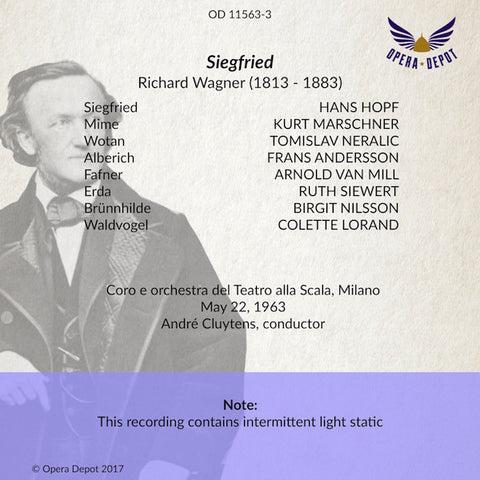
Vendredi 24 mai 1963 : Siegfried. Scala de Milan. Cluytens. Feiersinger. Marschner. Neralic. Andersson. Van Mill. Siewert. Birgit Nilsson (Brunnhilde).
Lundi 27 mai 1963 : BBC RADIO 3 - Birgit Nilsson participe à l'émission radiophonique de la BBC, DESERT ISLAND DISCS. Cette émission, créée le 29 janvier 1942, invite régulièrement une personnalité à laquelle on demande de choisir les 8 pièces musicales, le livre et l'objet de luxe qu'elle aimerait emporter avec elle sur une île déserte. A cette demande, Birgit Nilsson répond en choisissant : 1. Leise, leise, fromme Weise (Der Freischutz) 2. Die Forelle (Schubert) 3. I could have danced all night. 4. Nessun dorma (Turandot) chanté par Jussi Björling. 5. Jeg elsker dig (Grieg) 6. le duo d'amour de Tristan und Isolde. 7. La scène finale de Salomé (Strauss) et enfin, la musique qu'elle aime le plus : 8. Le Liebestod de Tristan und Isolde. Elle choisit également comme livre : The second world war (Winston Churchill) et comme objet de luxe ; Swedish crossword puzzles.
Mardi 28 mai 1963 : Gotterdammerung. Scala de Milan. Cluytens. Hopf. Neralic. Andersson. Van Mill. Birgit Nilsson (Brunnhilde). Meyfarth. Resnik.
Vendredi 31 mai 1963 : Gotterdammerung. Scala de Milan. Cluytens. Hopf. Neralic. Andersson. Van Mill. Birgit Nilsson (Brunnhilde). Meyfarth. Resnik.
Jeudi 6 juin 1963 : Die Walkure. Opéra royal de Stockholm. Gielen. Hoiseth. Tyren. Bjorling. Nordmo-Lovberg. Birgit Nilsson (Brunnhilde). Meyer. ENREGISTREMENT LIVE.
Vendredi 7 juin 1963 : THIS WEEK'S COMPOSER - BBC HOME SERVICE. Wagner. Records of ' Forest Murmur; and part of the closing scene from ' Siegfried ' with BIRGIT NILSSON as Brunnhilde
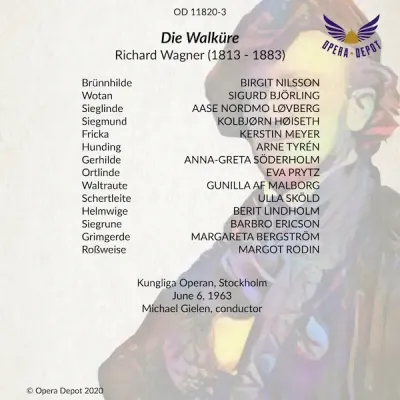
Dimanche 9 juin 1963 : Die Walkure. Staatsoper de Vienne. Karajan. Windgassen. Frick. Hotter. Rysanek. Birgit Nilsson (Brunnhilde). Rossel-Majdan.
Mercredi 12 juin 1963 : Siegfried. Staatsoper de Vienne. Karajan. Windgassen. Birgit Nilsson (Brunnhilde). Hotter. Pernerstorfer. Klein. Frick. Rossel-Majdan.
Samedi 15 juin 1963 : Gotterdammerung. Staatsoper de Vienne. Karajan. Windgassen. Birgit Nilsson (Brunnhilde). Brouwenstijn. Frick. Wiener. Pernerstorfer. Ludwig.
Mardi 18 juin 1963 : Turandot. Staatsoper de Vienne. Molinari-Pradelli. Birgit Nilsson (Turandot). Klein. Zaccaria. Prevedi. Price. Braun.
Jeudi 20 juin 1963 : Turandot. Staatsoper de Vienne. Molinari-Pradelli. Birgit Nilsson (Turandot). Klein. Zaccaria. Prevedi. Price. Pernerstorfer.
Samedi 22 juin 1963 : DESERT ISLAND DISCS- BBC HOME SERVICE. Birgit Nilsson, international dramatic soprano, discusses with Roy Plomley in a recorded programme the eight records she would take to a desert island.(Emission transmise le 27 mai)
Dimanche 23 juin 1963 : Tristan und Isolde. Staatsoper de Vienne. Karajan. Beirer. Hotter. Birgit Nilsson (Isolde). Wiener. Braun. Rossel-Majdan.
Jeudi 27 juin 1963 : Récital au Théâtre des Champs Elysées à Paris. Birgit Nilsson, Giuseppe Patane : Wagner, Verdi, Puccini.
Lundi 1 juillet 1963 : Concert Scheveningen, Kursaal, Hollande. Pierre Monteux / Amsterdam Concertgebouw orchestra. Tannhauser (ouverture). Siegfried-Idyll. Tristan und Isolde (prélude et mort d'Isolde - Birgit Nilsson). Götterdämmerung (voyage de Siegfried sur le Rhin, marche funèbre, scène finale - Birgit Nilsson) ENREGISTREMENT LIVE
Lundi 1 juillet 1963 : HOLLAND FESTIVAL CONCERT. First broadcast: Mon 1st Jul 1963, 20:15 on Third Programme. BIRGIT NILSSON (soprano) CONCERTGEBOUW Orchestra Conducted by Pierre Monteux. Wagner. Part 1. Overture: Tannhauset. Siegfried Idyll. Prelude and Llcbestod
(Tristan and Isolde)
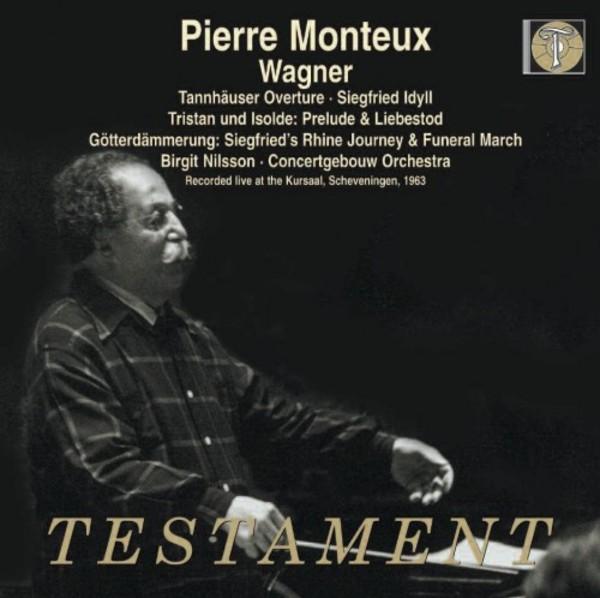
Vendredi 26 juillet 1963 : Tristan und Isolde. Festival de Bayreuth. Bohm. Windgassen. Greindl. Birgit Nilsson (Isolde). Neidlinger. Martell. Meyer. ENREGISTREMENT LIVE.
Mercredi 7 août 1963 : Tristan und Isolde. Festival de Bayreuth. Bohm. Windgassen. Greindl. Birgit Nilsson (Isolde). Neidlinger. Martell. Meyer.
Samedi 10 aout 1963 : Tristan und Isolde. Festival de Bayreuth. Bohm. Windgassen. Greindl. Birgit Nilsson (Isolde). Neidlinger. Martell. Meyer.
Mercredi 21 août 1963 : THIS WEEK'S COMPOSER - BBC HOME SERVICE. Richard Strauss. Records of the ' Dance of the Seven Veils ' and the closing scene from ' Salome ' with BIRGIT NILSSON in the title rôle.
Dimanche 25 aout 1963 : Die Walkure. Opéra royal de Stockholm. Gielen. Hoiseth. Tyren. Bjorling. Nordmo-Lovberg. Birgit Nilsson (Brunnhilde). Ericson.
Vendredi 6 septembre 1963 : BBC PROMS 42. Londres. Wagner One Hundred and fifteenth anniversary (150) : Lever du jour et voyage de Siegfried sur le Rhin. Acte III (Die Gotterdammerung). Prélude et mort d’ Isolde (Tristan und Isolde). Georg Solti / Wolfgang Windgassen, Marie Collier, Thomas Stewart, Gottlob Frick. ENREGISTREMENT LIVE.
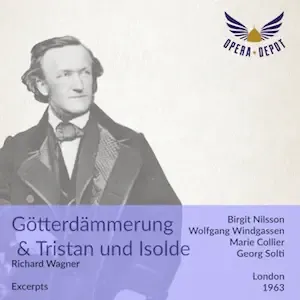
Mercredi 11 septembre 1963 : Gotterdammerung. Royal Opera House Covent Garden. Solti. Birgit Nilsson (Brunnhilde). Windgassen. Stewart. Frick. Collier. Veasey. Kraus.
Samedi 14 septembre 1963 : Gotterdammerung. Royal Opera House Covent Garden. Solti. Birgit Nilsson (Brunnhilde). Windgassen. Stewart. Frick. Collier. Veasey. Kraus. ENREGISTREMENT LIVE.
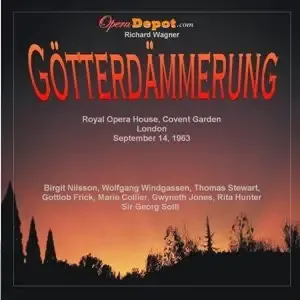
Lundi 16 septembre 1963 : Gotterdammerung. Royal Opera House Covent Garden. Solti. Birgit Nilsson (Brunnhilde). Windgassen. Stewart. Frick. Collier. Veasey. Kraus.
Jeudi 19 septembre 1963 : Gotterdammerung. Royal Opera House Covent Garden. Solti. Birgit Nilsson (Brunnhilde). Windgassen. Stewart. Frick. Collier. Veasey. Kraus.
Lundi 14 octobre 1963 : Aida. Opéra Metropolitan de New York. Solti. Birgit Nilsson (Aida). Bergonzi. Dalis. Sereni. Tozzi. Macurdy.
Review of Jay Harrison in the November 1963 issue of Musical America
The Metropolitan Opera's 79th season began on October 14 with a twofold spectacle-one off stage and one on. As to the former, the house was filled with chinchillas and tiaras and clothes of every describable texture and color, while accounting for the latter was a new production of Verdi's "Aida" conducted by Georg Solti and featuring Birgit Nilsson, as the heroine; Carlo Bergonzi, as Radames; Irene Dalis, as Amneris; Giorgio Tozzi, as Ramfis; and Mario Sereni, as Amonasro. Lesser roles were undertaken by John Macurdy, as the King; Robert Nagy, as a messenger; and Mary Ellen Pracht, as a priestess.
The first question that arises is whether or not the current "Aida" surpasses its previous incarnation at the Met. The answer to this is simple, for indeed it does, though in a very curious way. While the previous "Aida" was rather paltry and lacking in glamour, what we have now is a sumptuous production straight out of Hollywood. Cecil B. De Mille is its godfather, and every scene is guided-in sets, costumes and action-by the ghost of Mr. Dc Mille's exotic spectaculars. The Met's new "Aida" is massive, busy, everywhere grand and not a shade brainless. In mounting the work, Nathaniel Merrill has concentrated on all things lavish, even to the point that in the simple Nile Scene he and the designer, Robert O'Hearn, have seen fit to include at stage left a mountain which might satisfy even devotees of "The Ring."
In other words, nothing is left to the imagination so far as pomp and pageantry arc concerned. The whole production was clearly devised to be grand and glorious, as much of it is, the only exception being the Entombment Scene, which appears to be taking place in an abandoned mine shaft. Especially striking are the colors used throughout the production, which tend toward browns and are set off by the whole complement of shades which make browns glow like amber. Understand, there is nothing original to all this: the new "Aida" is new in name only. All its visual effects are old-hat and have been seen on countless other occasions. But there is a certain majesty to it, an opulence of design, if you will, that no other company in America is capable of producing.
Much the same can he said of Mr. Merrill's direction. It is standard, forthright and admits of no avant-garde monkeyshines. Every artist does precisely what you would expect him to do under the circumstances and, while there is no show of imagination, there is nothing either that touches on had taste. It is all very proper and calculated and, in the final analysis, a mite dull. Even the Triumphal Scene, with all its hundreds crammed onto the stage, is not overpowering; it is impressive, yes, but does not make the senses totter.
As to the singing, it too, was only a shade above the conventional. Miss Nilsson, rumor had it, was ailing, which may have been responsible for some unfocused tones that in the case of "O Patria Mia" became severely marked. Besides, she is a rather cold, detached Aida - she walks through the part with outlandish, silent-film gestures and rarely seems to get involved with the other characters who control her destiny. She is, in short, a puppet whose strings have got tangled.
Carlo Bergonzi, the Radames of the evening, is not an heroic tenor, which, unfortunately, made him seem somewhat lightweight for the role. His "Celeste Aida," for example, was notable for its lyric warmth, but the "ring," the brazenness the part requires was never a part of his performance. There is no question that his tenor is lovely-elegant, in fact. But we expect a Radames to be braver, more triumphant in his singing.
Samedi 19 octobre 1963 : Aida. Opéra Metropolitan de New York. Solti. Birgit Nilsson (Aida). Bergonzi. Dalis. Sereni. Tozzi. Macurdy.
Mardi 22 octobre 1963 : Aida. Opéra Metropolitan de New York. Solti. Birgit Nilsson (Aida). Bergonzi. Dalis. Sereni. Tozzi. Macurdy.
Jeudi 24 octobre 1963 : Der fliegende Hollander. Philadelphie. Karp. Moscona. Crain. Lehner. Vinay. Nilsson. ENREGISTREMENT LIVE.
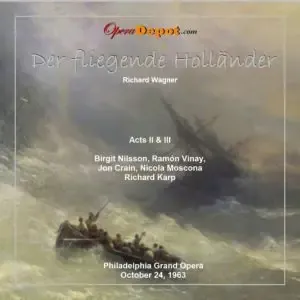
Lundi 4 novembre 1963 : Aida. Opéra Metropolitan de New York. Solti. Birgit Nilsson (Aida). Bergonzi. Dalis. Guarrera. Tozzi. Macurdy.
Dimanche 10 novembre 1963 : Aida. Opéra Metropolitan de New York. Solti. Birgit Nilsson (Aida). Bergonzi. Dalis. McNeil. Hines. Macurdy.
Jeudi 14 novembre 1963 : Gotterdammerung. Opéra Metropolitan de New York. Rosenstock. Birgit Nilsson (Brunnhilde). Hopf. Mittelmann. Curtis-Verna. Wiemann. Dalis. Pechner.
Review of Irving Kolodin in the Saturday Review
Reiner-less "Götterdämmerung"
Relative even to the other works of the Ring, "Götterdämmerung" is a massive test of stagecraft, musical skills, and organizational effort. Though we see it now as the summary of its predecessors, it was, of course, conceived as a saga in itself, a creation of accents and emphases carefully calculated to work against each other. Hagen's black villainy and Gunther's blind trust, Brüinnhilde's deception and Waltraute's despair, Siegfried's gullibility and Gutrune's innocence - all are shadings of a canvas on a heroic scale. In its first presentation at the Metropolitan this year, the accents and emphases were pretty much blurred together, so that Birgit Nilsson's Brünnhilde stood out as a single vivid figure in the foreground.
Possibly if Fritz Reiner had lived to see through the last task of his productive life (the preparatory effort sent him to a hospital with pneumonia, to which he succumbed within a week), there would have been drama and conflict in the interaction of the great conductor and the great singer. But it would hardly be rational to blame his emergency replacement, Joseph Rosenstock, who had stage rehearsals for the second and third acts and only an orchestral session for the first, for Hans Hopf's tight voice for Siegfried, Ernst Wiemann's inadequate range for Hagen, and the insufficiently bright sound of Mary Curtis-Verna for Gutrune. Rather than accents and emphases, they were varying shades of gray.
As a result, rather than being a music drama, in the Wagnerian sense, this Götterdämmerung was downgraded to the status of opera, with a star part for Miss Nilsson. The voice was not quite "awake" for the [first] scene with Siegfried (she is adverse to prolonged vocalization prior to so long a stint as this Brünnhilde). However, by the second act it was yielding a brightness and intensity that gave the denunciation of Siegfried's treachery and Brüinnhilde's participation in the plot of Hagen a high place in the Nilsson repertory. The tonal penetration that makes her an impressive Turandot strikes sparks against the outcry of the orchestra, with an aural splendor that eluded such recent paragons of the part as Flagstad and Traubel. She has also improved her action so that it mounts in impact up to and including the Immolation Scene.
Mardi 19 novembre 1963 : Aida. Opéra Metropolitan de New York. Solti. Birgit Nilsson (Aida). Bergonzi. Gorr. Sereni. Siepi. Macurdy.
Mardi 26 novembre 1963 : Aida. Opéra Metropolitan de New York. Solti. Birgit Nilsson (Aida). Bergonzi. Gorr. Sereni. Giaiotti. Macurdy.
Samedi 30 novembre 1963 : Tristan und Isolde. Opéra Metropolitan de New York. Prêtre. Parly. Birgit Nilsson (Isolde). Dalis. Cassel. Wiemann. Bottcher. ENREGISTREMENT LIVE.
Mercredi 4 décembre 1963 : Gotterdammerung. Opéra Metropolitan de New York. Rosenstock. Birgit Nilsson (Brunnhilde). Hopf. Cassel. Yeend. Ernster. Gorr. Davidson.
Samedi 14 décembre 1963 : Gotterdammerung. Opéra Metropolitan de New York. Rosenstock. Birgit Nilsson (Brunnhilde). Hopf. Mittelmann. Curtis-Verna. Wiemann. Dunn. Pechner. ENREGISTREMENT LIVE.
Mardi 17 décembre 1963 : THE BELL TELEPHONE HOUR. Épisode 6.6. Émission de Sid Smith avec The Bell Telephone Orchestra, Mel Brandt, Eydie Gorme, Lorin Hollander, Steve Lawrence, Birgit Nilsson, Eleanor Powell.
Mercredi 18 décembre 1963 : Die Walkure. Staatsoper de Vienne. Prohaska. Kozub. Kreppel. Wiener. Zadek. Birgit Nilsson (Brunnhilde). Hoffman..
Vendredi 20 décembre 1963 : Der fliegende Hollander. Staatsoper de Vienne. Prohaska. Bohme. Birgit Nilsson (Senta). Uhl. Hoengen. Dermota. Hotter.
Date inconnue : Birgit Nilsson enregistre au Gustaf Vasa Kyrka, Stockholm : Ave Maria (Gounod, Bach), Julsang (Adam), Panis Angelicus (Franck), Stilla Natt (Gruber). Organiste : Ake Leven. ENREGISTREMENT STUDIO
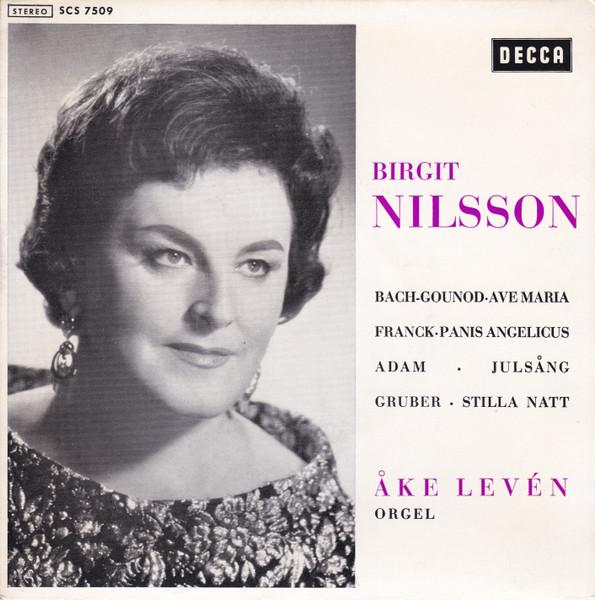
Mise à jour : pIERRE mARCHAIS 20251011